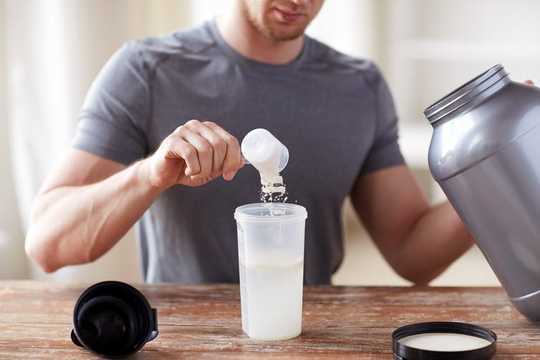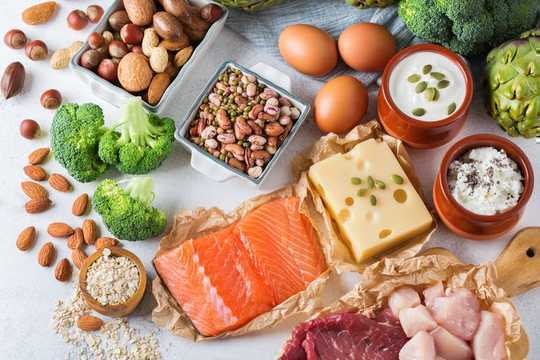 Do we really need that post-workout shake? Syda Productions/ Shutterstock
Do we really need that post-workout shake? Syda Productions/ Shutterstock
Once only used by bodybuilders, more and more people are using sports supplements as a regular part of their health and fitness regime – and the industry is booming worldwide. Protein shakes, powders, bars, and pills are being marketed to the average gym-goer as an essential part of getting fit. A recent study even found that over half of gym goers regularly consumed protein supplements as part of their training. But while protein is an essential nutrient that we can’t live without, these supplements might not be as necessary as we’re led to believe.
Protein is an essential nutrient that we can’t live without. Every cell in our body contains protein. We use it to build and repair tissues, as source of energy, and to make hormones and enzymes. But people might also use protein – often in the form of supplements – to help with gaining muscle, losing weight, and to optimise their workouts by improving performance and recovery. Consuming extra protein has even been shown to increase muscle development and strength when consumed as part of an exercise programme.
How much protein to eat, when to eat it and whether we should supplement with it (by drinking protein shakes, for example) has been debated by scientists for years. The current consensus points towards a slightly greater need than normal for people who take part in intense training, depending on their goals.
But not everyone needs to consume a high-protein diet. For a person weighing around 70kg, they’d need around 56g of protein (around 0.8g of protein per kilogram) a day. But for people looking to improve fitness and health, build muscle and recover more quickly after training, experts recommend consuming between 1.4g and 2g of protein per kilogram a day. This is roughly around 98g to 140g of protein for a 70kg person. This helps repair tissues damaged during training and improve recovery.
Get The Latest By Email
Lifting weights and consuming protein stimulates a process known as “muscle protein synthesis”. This is a naturally occurring process where new muscle is produced to repair those damaged during training. The effects of muscle protein synthesis are thought to be enhanced if protein is consumed before or after training. These days, drinking protein shakes after exercise has become commonplace, but is consuming them really necessary?
The muscle full effect
How much protein we should actually consume in one serving is a subject of debate by scientists. Most believe that around 20-25g of protein (the equivalent of one scoop of most protein powders, or found in 100g of lean chicken breast) is the optimal amount for maximising muscle protein synthesis. Anything greater than this is thought to be used for energy or excreted in our urine.
The point at which maximum muscle protein synthesis has been achieved in our muscles has been termed the “muscle full effect”. The idea is that muscle protein synthesis is only elevated for around 90-120 minutes after ingesting protein, before it returns to normal. This is even despite amino acids continuing to be available in the blood stream, stimulating muscle protein synthesis further.
This has led some people to suggest that there is a finite amount of protein that the muscle can use in one sitting, and that we should let blood amino acid levels return to baseline levels before the next meal. This observation came from research investigating whey protein. Whey protein is unique in that its amino acid levels appear and peak within the bloodstream rapidly and for only a short time following ingestion. Whey is considered a “fast-acting” protein.
But research has also shown that milk protein (which contains fast and slow-acting proteins) causes a sustained muscle protein synthesis due to a slower release of amino acids. This throws the short-term muscle full hypothesis into question. This might mean that the muscle full effect discussed in previous research might only be a characteristic of whey protein – perhaps because of its ability to be rapidly absorbed. And, while amino acid oxidation (the breaking down of amino acids for energy) increases with amounts of protein greater than 20g per meal, this isn’t the case for all types of protein.
 Lean chicken breast, greek yoghurt, broccoli and nuts are all sources of protein. Antonina Vlasova/ Shutterstock
Lean chicken breast, greek yoghurt, broccoli and nuts are all sources of protein. Antonina Vlasova/ Shutterstock
So, eating more than 20g of protein in one sitting might not be a waste after all – specifically if you eat whole food sources and don’t just drink whey protein shakes all day. Experts therefore recommend that consuming 0.25g of protein per kilogram – or 20-40g per meal is optimal for most people, which is a bit more than the amount needed to stimulate muscle protein synthesis.
But muscle building isn’t the only reason for consuming protein. Protein supplements have also been shown to improve weight loss when consumed as part of a calorie-controlled diet. Whey protein enhances the release of hormones that reduce appetite and increase satiety, making you feel fuller and less likely to snack. Supplementing with whey also helps to preserve muscle during weight loss too, which helps to maintain the metabolism.
However studies have also shown that high protein diets that don’t involve the use of protein supplements were equally effective as those that did – meaning the benefits of protein supplements might just be that they’re convenient and easy to consume. In fact, high protein diets might just be better for weight loss in general. And perhaps surprisingly, many of the recommendations for gaining muscle also seem to be prudent for weight loss too – 1.2–1.6g per kilogram a day, and 25-30g of protein per meal are recommendations supported by science, regardless of whether the protein comes from whole food or supplement.
So, do we really need protein supplements to get fit and look food? Well, probably not, as experts recommend we consume whole-food sources wherever possible. But if the protein supplement allows you to meet your daily protein needs, then it probably won’t hurt.![]()
About the Author
David Rogerson, Senior Lecturer in Sports Nutrition and Strength and Conditioning, Sheffield Hallam University
This article is republished from The Conversation under a Creative Commons license. Read the original article.
books_exercise







